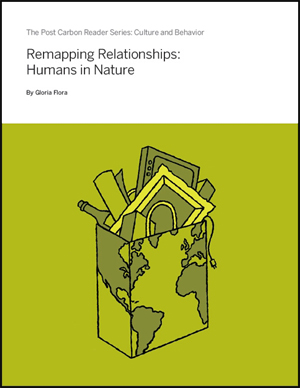
Remapping Relationships: Humans in Nature
February 7, 2011
It seems that the more a society sees itself as cerebral, with clever technological and material innovations, the more its bonds with, and recognition of, the significance of nature processes and ecosystems recede. The ability to create artificial environments (air conditioning, heating, lighting) and chemically alter natural materials (processed food, plastic) perhaps gives the illusion that humans are capable of meeting their needs with minimal inputs from nature. The flawed logic suggests that if humans are only tangentially dependent on the natural world, functioning ecosystems lose importance.
This chasm between humans and nature has widened to the point, especially in developed countries, where ubiquitous pollution and extirpation of species are commonplace-accepted by the masses as a nominal required consequence of economic growth.
This is a chapter from The Post Carbon Reader: Managing the 21st Century’s Sustainability Crises (2010).
